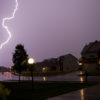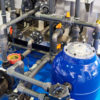If you want to have a pool that is clean and safe for use, your filtration and circulation system must work well. Floating residue, debris, bacteria, and organic matter are eliminated through the process of filtration. A successful season of pool use is based on the filtration system working properly, and Pool Troopers is here to answer your questions and help with maintaining a clean filter.
How does filtration work?
The water from the pool’s pump is pushed through the filter, which might contain sand, diatomaceous earth or a cartridge element. Dirt and particles are trapped in the filter media to be later dislodged and removed through cleaning or backwashing.
Types of Filters
Three of the types of popular filters are:
• sand
• diatomaceous earth
• cartridge
Sand filters – Sand is used as the filtering media in this filter. As water is pushed through a distribution head at the top of the filter, debris and contaminating factors are trapped by the sand as the water percolates down through the sand. The clean water is then returned into the pool. This filter type is the least efficient trapping contaminants that are larger than 40 microns.
Diatomaceous earth filters – Utilizing a sedimentary rock “DE” as the filtering media, this type of filter houses grids which are coated by the media to create the filtration. DE filters can filter particles that are as small as 5 microns, making it the most efficient of filtering media. For cleaning purposes, the DE filter is backwashed, and more DE is added. A pressure gauge shows the need for backwashing. New DE is added to coat the grids after backwashing by pouring it into the skimmer. This DE is a special grade, not the same as garden-grade DE (Diatomaceous earth is made from the sponge-like skeletons of Diatoms, a creature found in the ancient oceans).
Cartridge Filters – A paper-like element makes up the filter media in a cartridge filter. These filters need to be maintained at least monthly if not more frequently, and elements should be replaced annually. On some pools, oversized cartridge filters are used. These offer less maintenance than their smaller cousins, only requiring quarterly or semiannual cleaning. These are large filters however and most pool owners prefer to have a pool professional clean them as the task is difficult. Pool owners in water conscious environments often choose oversized cartridge filters due to the less frequent cleaning cycle using less overall water.
How often does a filter need to be cleaned?
All filters will show a spike in the pressure reading as they become dirty. This indicates it may be time to clean or backwash the filter. Every system will vary slightly, but as a general rule when the pressure rises 8-10 psi above the clean filter pressure its time to clean or backwash your filter. Again oversized filters require less cleaning so in this case, bigger is better and if you have an undersized filter you may experience constant struggles with your pool. Don’t skimp on your pool’s filter.
Other types of media for sand filters
There are other materials that have been used in place of sand, although sand is the least expensive; you might have to backwash it more often, however. The three types of materials used in a sand filter include:
• Sand
• Filter glass
Sand is environmentally-friendly and the least expensive. It filters particles in the range of 20-40 microns. Recently filter glass crushed recycled glass has been used as a media replacement for sand. It is a new technology but has some benefits over silica sand. Read more about the types of materials used in sand filters.
For commercial pools and spas, it is dictated by law in certain regions that all the water in a pool must pass through the filter in a time that ranges from 30 minutes to six hours – this is called turnover. For residential pools, we suggest the pool be turned over a minimum of twice per day. You can learn more about filtration here.
Pool Troopers can help with all your filtration questions. Give us a call or contact us; we have been the choice of satisfied clients since 1952 and can assist with all your pool maintenance needs.



